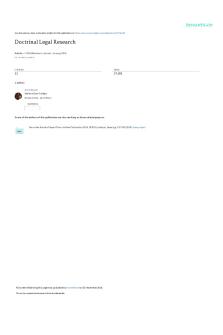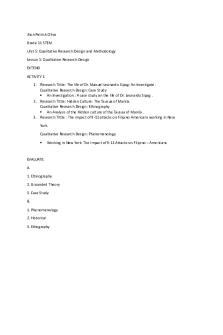Practical legal research ce01 template -final PDF

| Title | Practical legal research ce01 template -final |
|---|---|
| Course | Legal Research and independent project |
| Institution | University of Law |
| Pages | 6 |
| File Size | 197.7 KB |
| File Type | |
| Total Downloads | 22 |
| Total Views | 134 |
Summary
Practical research - template example filled in (partial)...
Description
Practical Legal Research Assessment
Candidate number:
EMAIL FROM: TO: SUBJECT: DATE:
Trainee Dan Williams [supervisor’s e-mail] Post-traumatic stress claim 5 December 2016
Dear Dan Please see below my conclusions with regard to the validity and procedural issues of the claim against St Patricks Hospital NHS Trust. Review of Research [ ]
Advice I SUGGEST that we request additional information with regard to -whether
Kind regards, Trainee
01f88e6bc928012fe6ff5de51a781305.doc
5
© The University of Law Limited 2016-2017
Practical Legal Research Assessment
Candidate number:
RESEARCH REPORT REF: CLIENT: MATTER: DATE:
[ [ [ [
] ] ] ]
ANALYSIS Facts and Instructions [ ] Defendant wants advice The report does not cover the following points: Damages
Legal Issues My research report deals with the following issues: 1. The validity of Claimant’s claim against the Defendant for post-traumatic stress (psychiatric injury) valid. 2. Procedural issues with regard to the claim. 3. [ ] CONCLUSIONS (episode by episode !!!) Report on Legal Issue 1: The validity of Claimant’s claim against the Defendant for post-traumatic stress (psychiatric injury) valid. Defendant would be held liable for post-traumatic stress disorder suffered by Claimant only if it could be shown that he owed Claimant a duty of care in relation to shock-inflicted psychiatric injury. As, allegedly there was no physical injury inflicted upon the Claimant, he is classified as a ‘secondary victim’ (his wife is classified as a ‘primary victim’, as she has suffered physical injury as a result of Defendant’s negligence). In order for a ‘secondary victim’ to qualify for a damages award the Claimant must: 1.
suffered a ‘reasonably foreseeable’ psychiatric injury was foreseeable in a person of ‘ordinary fortitude’ in the same circumstances as the Claimant
2.
have had a close personal relationship with the primary victim (either a spouse or a parent)
3.
have been present at the scene of the accident which caused the death/injury to the primary victim or must have been involved in its immediate aftermath
4.
have a recognised psychiatric injury that was caused by sudden and unexpected shock
© The University of Law Limited 2016-2017
6
01f88e6bc928012fe6ff5de51a781305.doc
Practical Legal Research Assessment
5.
Candidate number:
have perceived the death/ risk of injury to the primary victim with their own senses.
On the facts, as regards the first episode (30 th December 2013) I consider that: 1. This is the question of the fact of course. Arguably, it is ‘reasonably foreseeable’ that a person of ‘normal fortitude’ might suffer a psychiatric illness from fear of knowing that his spouse and baby could die. 2. the requirement is satisfied, as Primary victim is the claimant’s spouse 3. the Claimant has been present in the operating theatre 4. post-traumatic stress disorder is a recognised psychiatric injury. The loss of blood and ensuing behaviour and words of the hospital staff in the operating theatre could amount to sudden and unexpected shock. 5. Claimant has perceived the events with his own senses, as he was present in the operating theatre. While question of the fact, it could be considered that Claimant has a reasonable chance of success with regard to the first episode. As regards, the second episode: 1. It is arguable whether it is ‘reasonably foreseeable’ that a person of ‘normal fortitude’ might suffer a psychiatric illness from observing his spouse in unconscious condition with her arms, leg and face swollen. Case law suggests that such events, although distressing, took place in a hospital; context… without exposing him to any shocking sounds or sights … (W ARD V LEEDS)
2. the requirement is satisfied, as Primary victim is the claimant’s spouse 3. the Claimant has been present in the intensive care 4. post-traumatic stress disorder is a recognised psychiatric injury. Whether the from observing his spouse in unconscious condition with her arms, leg and face swollen would probably depend on whether he was informed about her condition in advance. Arguably, as he was informed about complication and operation, this would not have an an unexpected or sudden character. 5. Claimant has perceived the events with his own senses, as he was present in the intensive care. Thus, as regards the second episode, the Claimant might not be able to succesfully claim that the defendant had a duty of care, the events during the second episode did not have a sudden or unexpected character for the claimant. (argue ward …without exposing). Report on Legal Issue 2: 01f88e6bc928012fe6ff5de51a781305.doc
5
© The University of Law Limited 2016-2017
Practical Legal Research Assessment
Candidate number:
Procedural issues [Complete a summary of this sort for every issue that your research covered.] Time limit Under s 11. Limitation Act 1980 Claimant cannot bring a claim after the expiration of 3 years from action accrued or the date of knowledge (if later) of the person injured . The date when Claimant discovered the existence of post-traumatic stress disorder is not known, but considering that it might not have occurred before the first episode (30 December 2013), by bringing the claim on 23 June 2016 (??? – is this the stoppage date ?), the three-year period has not expired.
Protocol PRIMARY SOURCES Alcock v Chief Constable of South Yorkshire Police [1992] 1 AC 310 North Glamorgan NHS Trust v Walters [2002] EWCA Civ 1792 Ward v Leeds Teaching Hospitals NHS Trust Limitation Act 1980 s 11 - the three-year time limit for personal injury claims pursuant to the I found no relevant legislative acts. COMMENTARY I used the following commentary to support my research and ensure that it was up to date: Source
Location / Reference
Halsbury’s Laws 5th Ed in Lexis Library
Halsbury's Laws of England >
Subject matter & paragraph heading Liability for psychiatric damage (nervous shock),
NEGLIGENCE (VOLUME 78 (2010)) > 1. GENERAL PRINCIPLES OF THE LAW OF NEGLIGENCE > (1) NATURE OF NEGLIGENCE > (ii) Duty of Care: Particular Problems > 12. Liability for psychiatric damage (nervous shock)
© The University of Law Limited 2016-2017
6
01f88e6bc928012fe6ff5de51a781305.doc
Practical Legal Research Assessment
Candidate number:
(including footnote 17
Halsbury's Laws of England > DAMAGES (VOLUME 29 (2014)) > 7. MEASURE OF DAMAGES IN TORT > (3) PERSONAL INJURY > (ii) Heads of Damage > A. NONPECUNIARY LOSS > 438. Psychiatric injury. Nujno ? Validity not damages ?
Halsbury's Laws of England > LIMITATION PERIODS (VOLUME 68 (2016)) > 2. TIME-BARS ON PARTICULAR CAUSES OF ACTION > (1) USUAL LIMITATION PERIODS AND EXCLUSIONS > 952. Usual periods of limitation.
Halsbury's Laws of England > LIMITATION PERIODS (VOLUME 68 (2016)) > 2. TIME-BARS ON PARTICULAR CAUSES OF ACTION > (4) PERSONAL INJURY CLAIMS > 998. The limitation period.
Common Law Series: The Law of Tort in Lexis Library NOTES 01f88e6bc928012fe6ff5de51a781305.doc
5
© The University of Law Limited 2016-2017
Practical Legal Research Assessment
[
Candidate number:
]
TIME TAKEN Research: Reporting: Email:
[ [ [
] minutes ] minutes ] minutes
© The University of Law Limited 2016-2017
6
01f88e6bc928012fe6ff5de51a781305.doc...
Similar Free PDFs

IPP Legal Research Template
- 2 Pages

Doctrinal Legal Research Final
- 17 Pages

Practical Research 2 Final 2
- 63 Pages

Practical Research
- 15 Pages

PRACTICAL RESEARCH
- 46 Pages

Practical Research
- 3 Pages

Practical Research 1
- 14 Pages

Advanced-Legal-Research
- 20 Pages

Legal research checklist
- 5 Pages

Practical Research 1
- 19 Pages

@@@@ Legal Profession - Template 1
- 29 Pages

Legal Research and Methodology.pdf
- 774 Pages

What is legal research?
- 3 Pages
Popular Institutions
- Tinajero National High School - Annex
- Politeknik Caltex Riau
- Yokohama City University
- SGT University
- University of Al-Qadisiyah
- Divine Word College of Vigan
- Techniek College Rotterdam
- Universidade de Santiago
- Universiti Teknologi MARA Cawangan Johor Kampus Pasir Gudang
- Poltekkes Kemenkes Yogyakarta
- Baguio City National High School
- Colegio san marcos
- preparatoria uno
- Centro de Bachillerato Tecnológico Industrial y de Servicios No. 107
- Dalian Maritime University
- Quang Trung Secondary School
- Colegio Tecnológico en Informática
- Corporación Regional de Educación Superior
- Grupo CEDVA
- Dar Al Uloom University
- Centro de Estudios Preuniversitarios de la Universidad Nacional de Ingeniería
- 上智大学
- Aakash International School, Nuna Majara
- San Felipe Neri Catholic School
- Kang Chiao International School - New Taipei City
- Misamis Occidental National High School
- Institución Educativa Escuela Normal Juan Ladrilleros
- Kolehiyo ng Pantukan
- Batanes State College
- Instituto Continental
- Sekolah Menengah Kejuruan Kesehatan Kaltara (Tarakan)
- Colegio de La Inmaculada Concepcion - Cebu


